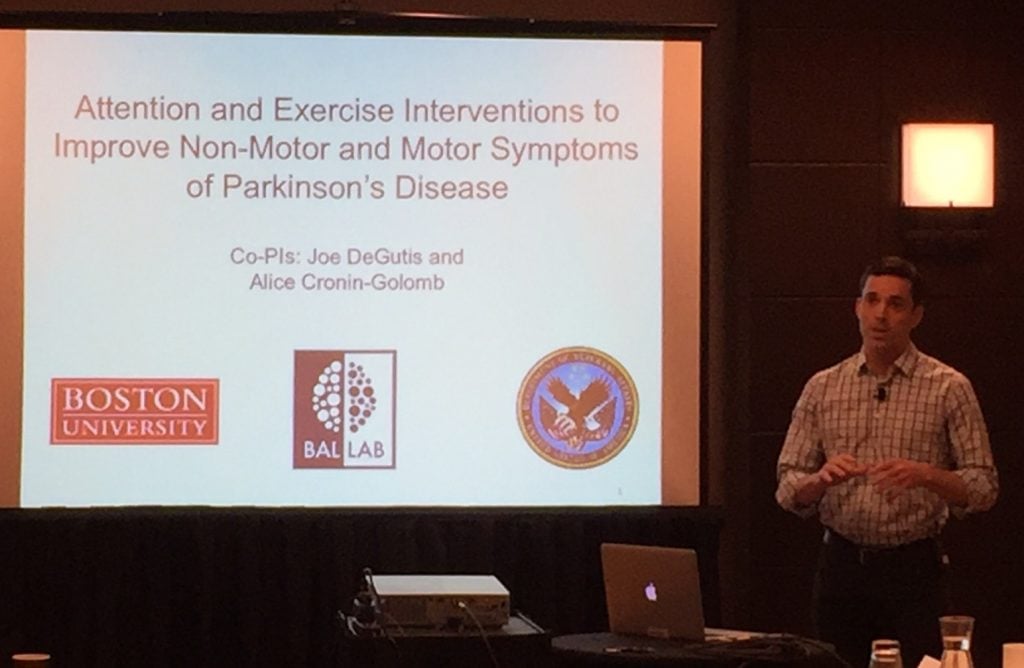 |
| APDA Scientific Advisory Board: (Front row L-R) Marie-Francoise Chesselet, MD, PhD, UCLA David Geffen School of Medicine; Marie Hélène Saint-Hilaire, MD, FRCP (C), Boston University School of Medicine; David G. Standaert, MD, PhD, Chairman of the APDA SAB, University of Alabama at Birmingham, School of Medicine; Mary Maral Mouradian, MD, Rutgers-Robert Wood Johnson Medical School; Leslie A. Chambers, President & CEO, APDA. (Back row L-R) Richard Myers, PhD, Boston University School of Medicine; Un Jung Kang, MD, Columbia University College of Physicians and Surgeons; Dennis W. Dickson, MD, Mayo Clinic, Jacksonville; Joel S. Perlmutter, MD, Washington University School of Medicine; Evan Yale Snyder, MD, PhD, The Burnham Institute; Clemens R. Scherzer, MD, Harvard Medical School and Brigham & Women’s Hospital . (Not pictured); Mahlon R. DeLong, MD, Emory University School of Medicine; J. Timothy Greenamyre, MD, PhD, University of Pittsburgh Medical Center; Laura Marsh, MD, Michael E. DeBakey, VA Medical Center |
This critical research funding is only possible due to the financial support from APDA’s steadfast supporters and the dedicated work of the SAB who gather on a regular basis to diligently review and recommend the most cutting edge research.
This year’s meeting was kicked off by Leslie A. Chambers, President & CEO of APDA who recognized four SAB members who reached a twenty year milestone of serving on the board: Marie-Francoise Chesselet, MD, PhD, UCLA David Geffen School of Medicine; Dennis W. Dickson, MD, Mayo Clinic, Jacksonville; Richard Myers, PhD, Boston University School of Medicine; and Mahlon R. DeLong, MD, Emory University School of Medicine
The SAB meeting also included research updates from four of the eight 2015-2016 junior investigators who each represent a vast diversity of research areas that can impact the treatment of PD.
Vivek K. Unni, MD, PhD, of Oregon Health and Science University is researching how the protein alpha-synuclein forms many types of aggregates that are either potentially toxic or could be protective to cells. While at Harvard Medical School and Brigham & Women’s Hospital in Boston, MA, Tim Bartels, PhD, is working to characterize pathology associated forms of alpha-synuclein to understand more about the mechanism of Parkinson’s pathogenesis and quantify their abundance as potential biomarkers. Jacqueline Burré, PhD, from Joan & Sanford I. Weill Medical College of Cornell University in New York, has sought to determine the link between age and alpha-synuclein pathology that will facilitate understanding the pathogenesis of sporadic Parkinson’s. Finally, studying non-motor symptoms, perception and cognition as it relates to normal and abnormal brain activity, Alice Cronin-Golomb, PhD, from Boston University, and Joseph DeGutis, PhD, from Boston University and The VA Boston Healthcare System are exploring the effectiveness of exercise and cognitive training interventions in Parkinson’s to determine whom it is best suited for.
 |
| Joseph DeGutis, PhD, Boston University and The VA Boston Healthcare System presents research findings to the APDA SAB |
APDA has been at the forefront in funding many of the major Parkinson’s Disease scientific discoveries in the last 50 years including the work of Dr. George C. Cotzias, which led to establishing the effectiveness of high oral doses of Levodopa in treating PD; the work of Dr. Roger Duvoisin and his team that led to identifying the role of heredity and environment in PD; the research of Dr. Menek Goldstein establishing the role of dopamine agonists in Parkinson’s Disease treatment; and the research of Dr. Lawrence Golbe at Robert Wood Johnson Medical Center, which led to the discovery of a mutation in the gene alpha-synuclein, named PARK1.
The announcement of 2016-2017 grant funding will take place in August.
###
